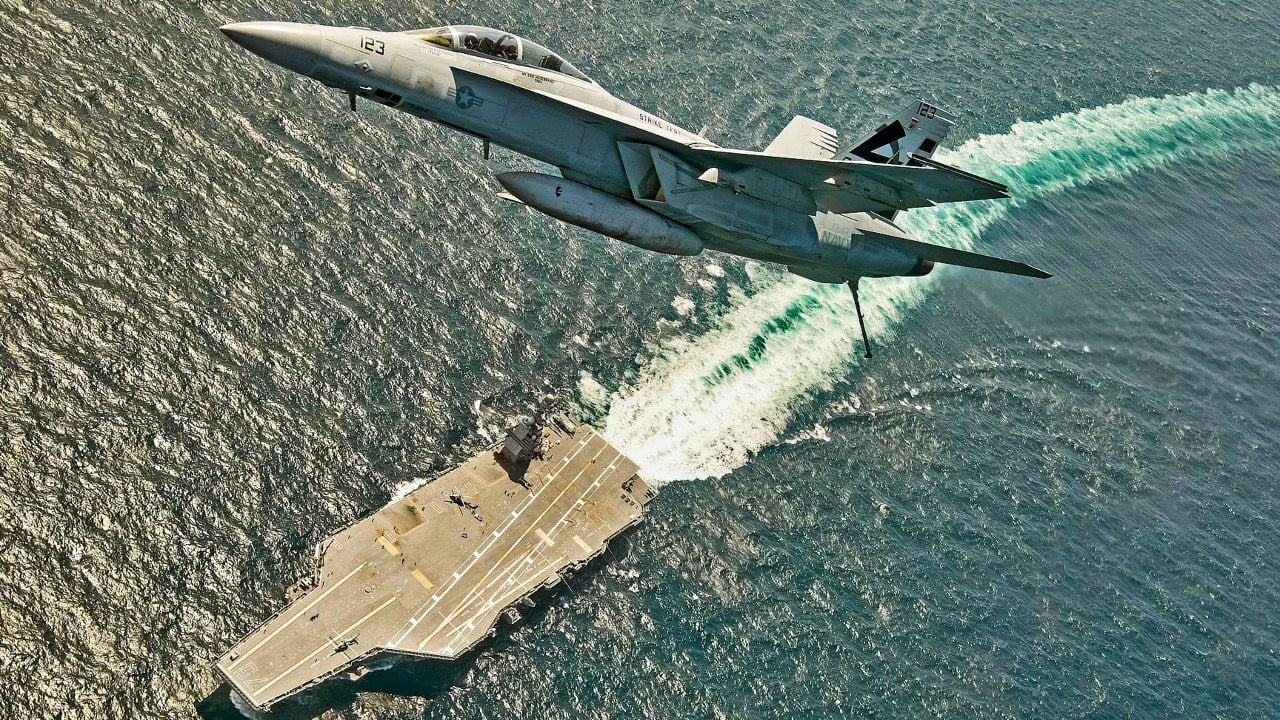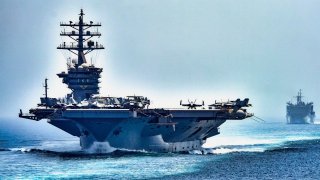What Happens if Russia or China Strike a U.S. Navy Aircraft Carrier?
China knows – and we can hope that Russia, Iran, North Korea, and any other nation also understands – that sinking a U.S. aircraft carrier won't cripple the United States.
Would a Sunk Carrier Result in Nuclear War? - In May of this year, Timothy Noah of The New Republic posed the question, "Why on Earth Are We Still Building Aircraft Carriers?" He took the argument that these massive floating airbases are antiquated and susceptible to attack while also noting, "They employ a lot of people in a lot of congressional districts."
In that, he answered his own question, but there is more to it.
As this reporter has written about multiple times, carriers are as vulnerable to attack as any warship.
Yet, there is nothing that offers the flexibility and capabilities of a modern carrier in both peacetime and wartime.
Aircraft carriers are still mighty tempting targets – but we must ask if anyone would actually strike one in peacetime.
China is likely hardly alone in developing so-called "carrier killer" missiles, while every potential adversary probably has their military eggheads figuring out to sink one. The question isn't whether a carrier can be sunk of course; it is what happens if such an unthinkable event occurs.
As Noah noted, "The sinking of a U.S. supercarrier would likely prompt an instant declaration of war. The stakes would be too high. Thousands of American sailors would be dead, and $13 billion would lie at the bottom of the sea. Knowing this probably deters China (and Russia and Iran, if those countries really do have carrier-killers) from trying to sink U.S. carriers outright."
He further pointed out that the Chinese DF-21D isn't even designed to "sink" a carrier, but rather to achieve a mission kill – forcing the carrier to limp back to port. Efforts to repair it would present challenges for the U.S. given the sorry state of the industrial base. We simply lack the facilities and more importantly, the personnel to build and maintain the U.S. Navy's warships in peacetime.
Lord, help us in wartime.
Aircraft Carrier Attacked: What Would the Response Be?
China knows – and we can hope that Russia, Iran, North Korea, and any other nation also understands – that sinking a U.S. aircraft carrier won't cripple the United States.
Such an attack would need to be part of a larger and well-coordinated effort to hit critical infrastructure, and even then, the United States maintains a large number of "second strike" nuclear ballistic missile submarines that could respond to such an attack.
As Craig Hooper, senior contributor for Forbes.com reported earlier this year, "Even if China managed to successfully attack and sink an American aircraft carrier, past military action suggests much of the stricken carrier's crew and air wing would likely survive."
Hooper added that in the Second World War, while America lost four big fleet carriers in military actions, none lost more than 10 percent of its crew.
"Thousands were rescued, living to fight another day," he further explained.
Those thousands might live, but it is likely millions would die in any subsequent war.
The attack on Pearl Harbor didn't break America's will to fight. It had the opposite effect.
Even if the U.S. Navy's carriers had been lost, the nation would rally together, and the United States would have still built the warships and other weapons to take the fight to the enemy. The September 11 terrorist attacks on the World Trade Center and the Pentagon are further proof that all it takes to unify a divided nation is such a strike.
As previously reported by Robert Farley for The National Interest, "An out-of-the-blue attack from a conventionally armed state actor would enjoy the highest levels of success, but would also have an impact on elite and public opinion in the United States that might drive calls for dire retribution. An attack as part of a crisis would seem less extraordinarily hostile, but would nevertheless incur demands for a severe response."
Again, Beijing knows this all too well. It may have carrier-killer missiles, but China is in no position to take the fight to the United States. Any conflict would almost certainly be fought closer to its borders, and the U.S. has the means and likely would have the will to strike China's cities in retribution.
This could quickly escalate into an unthinkable confrontation, including one involving nuclear weapons.
The same holds true with Russia.
An attack on a U.S. carrier would almost certainly result in NATO invoking Article 5. Moscow would face a war that would do great damage to Russia, and unless nukes were employed, it couldn't see America suffer all that much.

The Wild Cards
China and Russia clearly have the greatest capabilities to sink an American supercarrier, but as stated, they also have the foresight to understand that it wouldn't bring victory and would only result in a war that they couldn't possibly win.
However, the same might not be true of Iran and North Korea. Each has been developing weapons that could sink a carrier – including Tehran's Abu Mahdi sea-skimming anti-ship missile.
Iranian Rear Admiral Alireza Tangsiri, the commander of the IRGCN, said during the July ceremony in which the missiles were revealed, "One of the things that this missile can do is to repel the enemy, and it can drive the enemy away from our coasts."

Tangsiri even suggested that the missiles would force the U.S. Navy's aircraft carriers to withdraw so far that aircraft couldn't reach Iran.
A rogue state might try something truly foolish, like attacking a carrier.
Yet, if a U.S. warship – not just a carrier – were to be targeted by such a weapon, it would simply mean that the current regime better start buying copies of Froder's "Best Countries to Go Into Exile" or make peace with whatever god they worship, for they wouldn't be long on this Earth.
Author Experience and Expertise
Peter Suciu is a Michigan-based writer. He has contributed to more than four dozen magazines, newspapers, and websites with over 3,200 published pieces over a twenty-year career in journalism. He regularly writes about military hardware, firearms history, cybersecurity, politics, and international affairs. Peter is also a Contributing Writer for Forbes and Clearance Jobs. You can follow him on Twitter: @PeterSuciu.
All images are Creative Commons.


